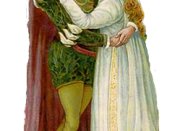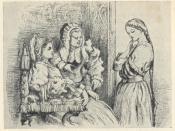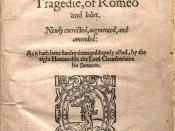Romeo and Juliet There are leaders and there are followers in William Shakespeare's The Tragedy of Romeo and Juliet. In the city of Verona there are Capulets and Montagues who are always at a war. The citizens would pick the fights, which leads the Capulets and Montagues to begin a war. Romeo is the son of Lord and Lady Montague. Juliet is the daughter of Lord and Lady Capulet. Prince Escalus of Verona is a leader to his people. That effect is carried out with Lord Capulet in the fact that he follows his leader, the Prince. Lord Capulet's nephew Tybalt is not changed by the words given by his uncle. If Lord Capulet was more of a leader, than I believe that Tybalt would be a follower and a leader because he did not like his uncle's way, but he did stop for his uncle. That doesn't mean that Tybalt was going to cease forever because of his character make-up.
William Shakespeare made these characters' traits specifically because of the effect it left on Romeo and Juliet. These characters caused the death of Romeo and Juliet by how they acted and portrayed themselves on each one of them. William Shakespeare's Romeo and Juliet are killed by the effect of the leading and following performed by Prince Escalus, Lord Capulet, and Tybalt.
Prince Escalus of Verona was a leader in the sense of how he portrayed himself amongst his fellow people, which aided in the death of Romeo and Juliet. "Have thrice disturbed the quiet of our streets/ And made Verona's ancient citizens/ Cast by their grave beseeming ornaments/ To wield old partisans, in hands a old, / Cankered with Fromm, 2 peace, to part your cankered hate," (Page 17; lines 99 to 103). The Prince wants peace...


